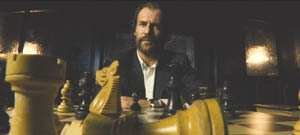|
Everywhere I look-provided that I'm looking for reviews of this movie-I see critics lining up to bash Guy Ritchie's newest Brit-crime opus. "Irritatingly counfounding," they say. "Jumbled, confusing, pretentious, overreaching, anticlimactic," they say. What, then, does it say about me that I rather enjoyed it? What, indeed? Do I really give a fuck? This film seems positioned to generate sharp polarization from its audience: genius or travesty. I'm inclined towards neither, being perhaps less polarized than the average "it's either brilliant or total crap"-minded moviegoer. I honestly can't dispute that any of the above mentioned criticisms are actually untrue. But I really enjoyed the film anyway. 
Revolver is Ritchie's attempt to return to the genre that spawned his popularity, while putting a new spin on his typical gangster crime drama. The new spin is the part engendering the most complaints, so let's start from the beginning: Jake Green (Jason Statham) has just been released from prison after seven years, a stint he received courtesy of up-and-coming player Dorothy Macha. Dorothy is a man, by the way, played by Ray Liotta, and why he is named thus is but one of the smaller mysteries here. Or maybe not. A man named "Dorothy" is actually pretty bewildering. But whatever. While waiting out his term in solitary, Jake is sandwiched between a pair of brilliant con artists who pass their plans and schemes back and forth through Jake, who learns their tricks and uses them to good effect after his release. Determined to get some personal satisfaction, he seeks out Macha, who now runs a successful casino, and takes his old rival for a small fortune, although we don't see how. Determined not to be made light of, Macha puts out a hit on Jake, who is saved by Zach and Avi, a pair of shadowy loan sharks. They offer him protection for the small price of everything he's amassed over his past two years of freedom. Jake also learns that he has been diagnosed with a rare and aggressive blood disease that will likely kill him within mere days. He smells a con game at work, but cannot seem to refute the diagnosis. The pair promise they can keep him safe-whether they mean from Macha, or the illness, or both, is not completely certain. Meanwhile, Macha finds himself with his hands full of trouble after getting involved in a coke deal with the mysterious underworld figure Sam Gold, only for Jake and his benefactors to make off with the drugs, leaving poor Dorothy at the mercy of rival boss Lord John, the only man capable of providing him with enough dope to replace what was stolen. Sam Gold, it is said, doesn't give second chances. It's convoluted, but no more so than many other crime thrillers. Very often, it's the direction and editing that contribute to the sense of disorientation. One major plot upheaval is depicted by jumping straight to the aftermath, then intercutting those scenes with flashbacks of what led up to the present point, including scenes wherein the characters begin to turn into cartoons. In the large majority of scenes, Jason Statham provides a running voice-over, but not in the service of explaining the overall goings-on. It's an in-the-moment commentary, not an omniscient one, and Jake's mind rambles away as he attempts to discover what is happening to him as he's forced to loan out his hard-won cash in service of Zach and Avi's operation. "You know you can't take it with you," he tries to tell himself, with little success, "so why does it still hurt?" And when his brother calls with dire warnings about Jake's newfound partners, whom even Sam Gold apparently won't touch, he begins to wonder just how big a mess he's fallen into. Is he being taken for a ride, or is something even bigger, even more subtle and fundamental, actually transpiring? 
All along, Revolver tantalizes us with a fascinating guessing game, one which, though very unusual in its final summation, isn't ultimately resolved in a way that feels altogether satisfying. While the meta-meaning comes across clearly enough (if not all that clearly), certain non-metaphorical plot points seem to waft by unexplained; how exactly did Zach predict Jake's impending blackout, for example? We're not really sure. The film has two major twists, and while one is very esoteric and unlikely to be discovered ahead of time, the more conventional one is, despite Ritchie's attempts at misdirection, disappointingly transparent. Anyone expecting a nice, tidy wrap-up a la Lock, Stock, and Two Smoking Barrels may be disappointed in what they get instead, and I can't entirely fault anyone for such a reaction. Bullets fly and panic mounts on all sides as the main thrust of the story slinks quietly by in the subtext of a chess game. The film isn't as brilliant or clever as it so desperately wants to be, but it's visually arresting and utterly stylish, and still more clever than most films in its overall niche. Guy Ritchie has done better films. But do I think that this one was a worthy experiment? Absolutely. If I find myself still thinking over a film's details twenty-four hours after my second viewing, I have to conclude that, despite its faults, there was something in there that grabbed me. Plus, that Sorter guy was awesome. Though if you're trying to paint your film as an intellectual endeavor, you'd do well to avoid giving face time to a New Age nut like Deepak Chopra, a man who thinks that we can "control the ways in which our bodies 'metabolize' time," and conversely claims that time doesn't exist. There's a wide gulf between entertaining new ideas and just being silly.
-review by Matt Murray
|
|
||||||||